1919
Pete is born in Manhattan to Charles Seeger Jr., a Harvard-trained composer with pacifist views, and Constance de Clyver, a concert violinist. He is the youngest of the couple’s three sons.
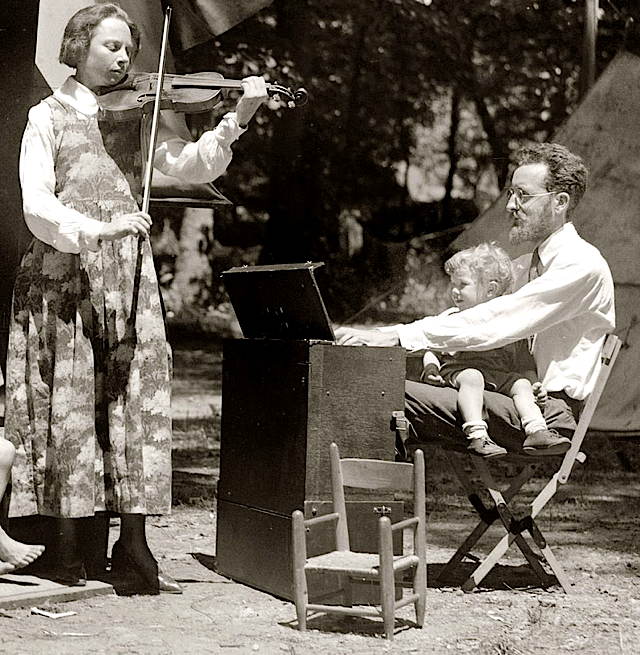
1920
The family sets out in a Model T Ford hauling a homemade trailer to perform classical music in the rural South. Pete’s mother ends the trip after she stops her toddler at the last moment from walking into a campfire.

1932
Pete buys a used, four-string (tenor) banjo while attending a private high school in Connecticut but eventually realizes he can’t play folk music on it.
1936
Pete hears the five-string banjo when his father takes him to the Mountain Dance and Folk Festival in North Carolina. “I discovered there was some good music in my country that I never heard on the radio,” he recalled.
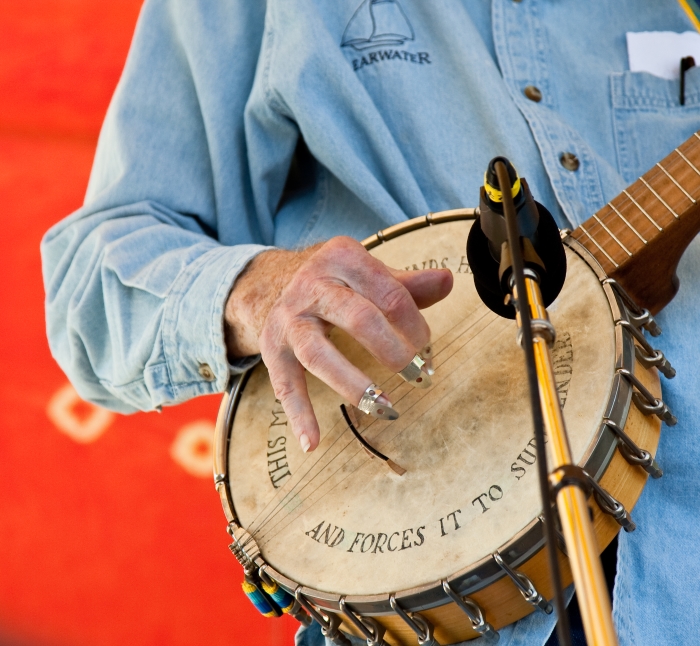
1938
Pete, a member of the Young Communist League, grows disillusioned at Harvard and drops out. His stepmother (his parents had divorced) tells him, “Peter, you have a talent for song-leading. I think you should develop it.” He spends the summer traveling with the Vagabond Puppeteers.
1939
Pete takes a job at the Library of Congress in the Archive of American Folk Song. He meets Woody Guthrie when they both play the same benefit.
1940
Through a work connection, Pete performs on radio programs with Guthrie, Josh White, Burl Ives and Lead Belly.
1941
Pete is a founding member with Guthrie of the Almanac Singers, which releases an album, Songs of John Doe, that is critical of the draft.
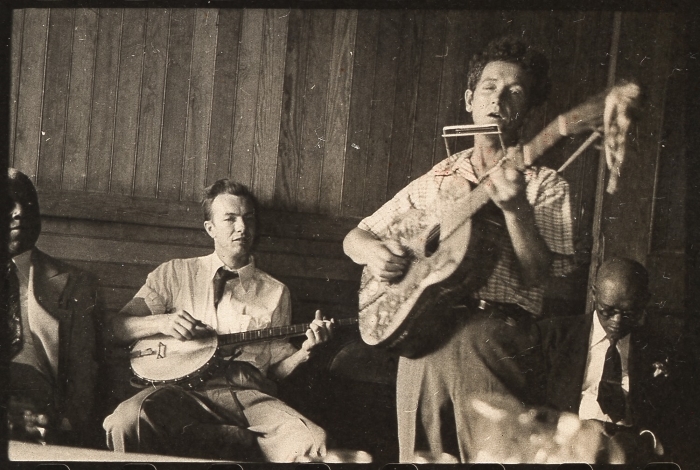
1942
After the U.S. enters the war, the Almanac Singers release a new album, Dear Mr. President, on which Pete sings: “Now, Mr. President, / We haven’t always agreed in the past, I know, / But that ain’t at all important now. / What is important is what we got to do, / We got to lick Mr. Hitler, and until we do, / Other things can wait.” … Pete is drafted into the U.S. Army and sent to the Pacific.
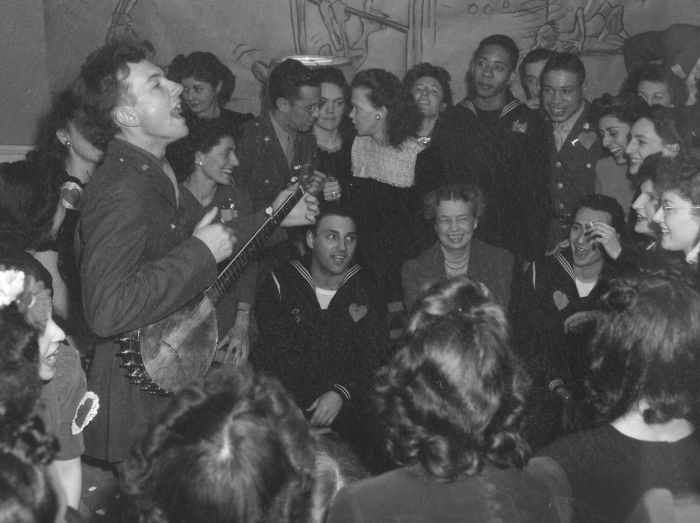
1943
Pete marries Toshi Ota. Their first son, Peter, dies at age six months while Pete is deployed. The couple will have three more children: Daniel, Mika and Tinya.
1948
Pete returns from the Army and, with three friends, forms The Weavers.
1949
Pete and Toshi, who are living with her parents in Greenwich Village, buy 17 acres at the base of Mount Beacon and build a two-room log cabin. Pete joins the Dutchess Junction Volunteer Fire Department, and quits the Communist Party. “I thought it was pointless,” he said.
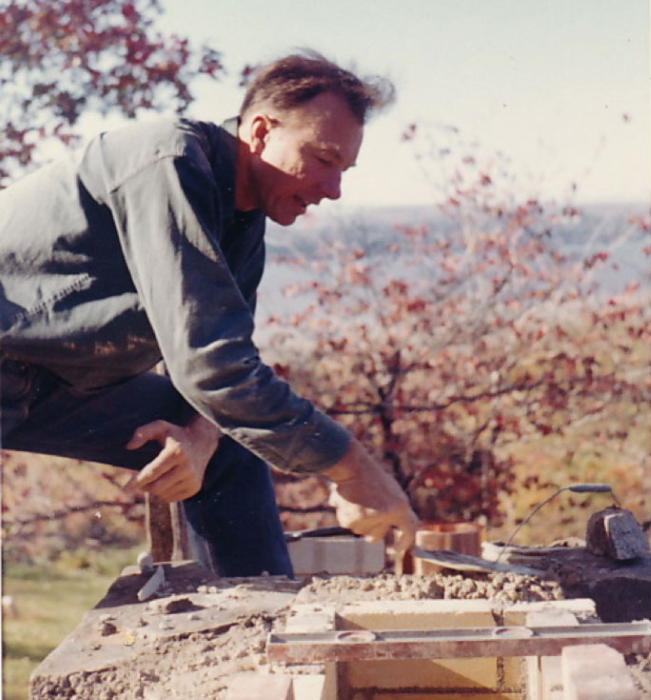
1950
The Weavers top the charts for 13 weeks with a cover of Lead Belly’s “Goodnight Irene.” Within a year, the group has sold 4 million records. Pete tells Time: “It’s not so much fun now.”
1952
The Weavers are blacklisted after an informant tells the House Un-American Activities Committee that three of its four members, including Pete, are Communists.
1955
Pete is ordered to testify before the committee.
SEEGER: I feel that in my whole life I have never done anything of any conspiratorial nature and I resent very much and very deeply the implication of being called before this committee that in some way because my opinions may be different from yours, or yours, Mr. Willis, or yours, Mr. Scherer, that I am any less of an American than anybody else. I love my country very deeply, sir.
CHAIRMAN WALTER: Why don’t you make a little contribution toward preserving its institutions?
SEEGER: I feel that my whole life is a contribution. That is why I would like to tell you about it.
CHAIRMAN WALTER: I don’t want to hear about it.
1955
The Weavers regroup to play a sold-out show at Carnegie Hall. But Pete leaves in 1957 after the other three members agree to do a cigarette commercial.
1957
Pete is indicted on 10 counts of contempt of Congress. He is convicted in 1961 and given a year in jail but the sentence is overturned on appeal.
1959
At the Newport Folk Festival, writer Studs Terkel introduces Pete as “America’s tuning fork.”
1960
Pete and others popularize the spiritual “We Will Overcome” as the anthem of the civil rights movement. Pete
says he changed “will” to “shall” to make it easier to sing.
1962
The Kingston Trio has a hit with Pete’s “Where Have All the Flowers Gone?” and Peter, Paul and Mary with
“If I Had a Hammer.”
1965
The Byrds top the charts with Pete’s “Turn! Turn! Turn!”
1966
Pete and Toshi found Hudson River Sloop Clearwater.
1967
The Smothers Brothers ask Pete to perform his anti-war song, “Waist Deep in the Big Muddy,” during a taping of their variety show, but it is cut by CBS censors.
1969
The Clearwater, a replica of a Hudson River sloop, is launched.
1982
Pete performs at a benefit concert for the Solidarity resistance movement in Poland.
1994
Pete receives the National Medal of Arts from President Bill Clinton, as well as the Kennedy Center Honor.
1995
Pete tells The New York Times: “I still call myself a communist, because communism is no more what Russia made of it than Christianity is what the churches make of it.”
1996
Pete wins the Grammy for Best Traditional Folk Album for Pete. He also is inducted into the Rock & Roll Hall of Fame.
2009
Pete and his grandson, Tao Rodriquez-Seeger, sing Guthrie’s “This Land is Your Land” with Bruce Springsteen at Barack Obama’s inaugural concert… Pete wins the Grammy for Best Traditional Folk Album for At 89.
2010
Pete wins the Grammy for Best Musical Album for Children for Tomorrow’s Children.
2013
Toshi dies on July 9 at age 91.
2013
Pete is nominated for a Grammy for Best Spoken Word Album for Pete Seeger: The Storm King: Narratives, Poems.
2014
Pete dies in a New York City hospital on Jan. 27 at age 94. After his death, he is named the inaugural winner of the Woody Guthrie Prize.
More on Pete at 100
- Remembering Pete
- Moments from a Life
- When Pete Seeger Wasn’t Welcome
- 5 Questions: Jeff Place


